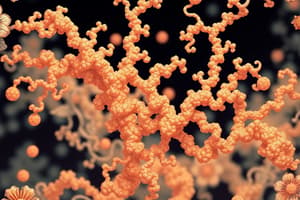Podcast
Questions and Answers
Which type of protein is collagen?
Which type of protein is collagen?
- Membrane protein
- Fibrous protein (correct)
- Enzyme
- Globular protein
What type of proteins are enzymes?
What type of proteins are enzymes?
- Membrane proteins
- Fibrous proteins
- Structural proteins
- Globular proteins (correct)
Which food source is NOT mentioned as a rich source of protein?
Which food source is NOT mentioned as a rich source of protein?
- Bananas (correct)
- Lentils
- Fish
- Broccoli
What is the main function of hemoglobin as discussed in the text?
What is the main function of hemoglobin as discussed in the text?
In what type of proteins are keratin and actin classified?
In what type of proteins are keratin and actin classified?
What role do antibodies play in the body based on the text?
What role do antibodies play in the body based on the text?
What is the primary component that makes up proteins?
What is the primary component that makes up proteins?
Where does protein digestion begin in the human body?
Where does protein digestion begin in the human body?
Which of the following is NOT a function of proteins in the body?
Which of the following is NOT a function of proteins in the body?
What determines a protein's unique structure and function?
What determines a protein's unique structure and function?
Which term refers to the folding and arrangement of amino acids in a protein?
Which term refers to the folding and arrangement of amino acids in a protein?
What type of bonds link amino acids together in a protein?
What type of bonds link amino acids together in a protein?
Flashcards are hidden until you start studying
Study Notes
Protein: An Essential Building Block for Life
Protein is a fundamental compound that plays a central role in the structure, function, and growth of living organisms. As you delve into the world of protein, you'll discover its intricate structure, the process through which our bodies digest it, its diverse functions, various types, and the sources from which we obtain them.
Protein Structure
Proteins are composed of chains of amino acids, which are linked together by peptide bonds. The sequence of amino acids determines the protein's unique structure, function, and properties. The folding and arrangement of these amino acids result in a three-dimensional structure, also known as a protein's secondary, tertiary, and quaternary structures.
Protein Digestion
Protein digestion begins in the mouth, where proteins break down into peptides through the action of enzymes called proteases, specifically the enzyme pepsin. As food moves through the digestive system, proteins are further broken down by enzymes like trypsin and chymotrypsin in the small intestine, resulting in the formation of smaller peptides and amino acids that can be absorbed into the bloodstream.
Protein Functions
Proteins serve numerous functions in our bodies, such as:
- Structure: Proteins provide structural support and form the basis of cellular and extracellular structures. For example, actin and myosin form microfilaments, which are essential for muscle contraction and cell shape. Collagen, a fibrous protein, provides structural support to tissues like skin and bones.
- Transport: Proteins transport essential molecules across cell membranes and throughout the body. Hemoglobin, for example, binds to oxygen and carries it in the bloodstream.
- Regulation: Proteins are involved in the regulation of cellular processes, including signaling pathways, gene expression, and cell growth.
- Catalysis: Enzymes are proteins that function as biological catalysts, speeding up chemical reactions in the body.
- Defense: Antibodies, which are proteins produced by immune cells, recognize and bind to foreign substances, helping to neutralize pathogens.
Protein Types
Proteins can be classified into various types based on their structure and function:
- Fibrous proteins: Collagen, keratin, and actin are examples of fibrous proteins. They are long, thin, and insoluble in water.
- Globular proteins: These proteins have a spherical or irregular shape and are soluble in water. Enzymes are examples of globular proteins.
- Membrane proteins: These proteins are embedded in cell membranes and serve various functions, such as transporting molecules across the membrane or participating in cell signaling.
Protein Sources
Proteins are found in a variety of foods, including:
- Animal sources: Meat, poultry, fish, eggs, dairy, and their by-products are all excellent sources of protein.
- Plant sources: Legumes (beans, peas, lentils), nuts, seeds, whole grains, and some vegetables (like broccoli and spinach) are all rich in protein.
Incorporating a variety of protein sources into your diet ensures that you obtain all the essential amino acids needed for growth, repair, and maintenance of tissues.
In conclusion, protein is an essential building block of life with a diverse range of functions, structures, and sources. Understanding its complexities and applications in biology is crucial to appreciating the intricate interplay of various biological processes.
Studying That Suits You
Use AI to generate personalized quizzes and flashcards to suit your learning preferences.



